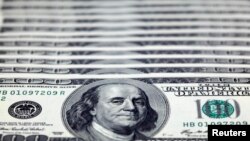The human rights group Oxfam says the wealth of the world's 85 richest people equals that of half the world's population.
Oxfam released a study on global inequality on Monday, before a meeting this week of government and business leaders at the World Economic Forum in Davos, Switzerland.
A co-author of the report, Nick Galasso, tells VOA that wealthy elites have used their political power to get lower tax rates, hide wealth offshore, and otherwise serve their own interests.
"High levels of inequality actually corrode democratic processes. What we have seen across the globe and what the report documents is how wealth concentration is used to influence the political process to create laws and regulations that benefit the rich over everyone else," said Galasso.
He said high levels of inequality hurt economic growth, make it harder to reduce extreme poverty and lead to a variety of social ills, including crime and disease.
Oxfam said that "by some measure, the riches of billionaires are now unparalleled in history." Last year, Forbes calculated the combined fortunes of the 85 wealthiest at nearly $1.7 trillion.
The report did not name the world's 85 richest individuals, but cited lists compiled by Credit Suisse bank and Forbes magazine.
Oxfam said the income alone derived from the $73 billion fortune of the world's richest individual, Mexican telecommunications mogul Carlos Slim, could pay the yearly wages of 440,000 Mexicans.
The report lists financial deregulation, tax havens and secrecy, and diminished public services as examples of political maneuvering by the wealthy. It said the effect of these policy changes is not only to concentrate wealth and political influence in higher income brackets but to ensure it stays there for the next generation.
Oxfam says in the past decade the number of billionaires in India has increased tenfold, while in Europe austerity measures mainly affect the middle and lower classes. It says in Africa, global corporations exploit their political influence to avoid taxes, reducing government resources to fight poverty.
Oxfam is calling for those business leaders and government delegates attending the World Economic Forum to support government programs that strive to help under-served middle- and lower-income levels; support development of fair wages; and crack down on tax dodging and financial secrecy.
Galasso acknowledged reducing inequality will not be easy.
"I think that this is certainly an uphill battle, but this is the right moment. If you scan the Internet, if you look at the news, this is the issue, this is a global issue that people seem to overwhelmingly care about. What we are asking world leaders at Davos, the movers and shakers, to do is to instead of using their influence to, for example, generate better tax policies for themselves or allow them to ship their profits out of state so they do not get taxed, we are asking them to use their influence to help create a more harmonious society where there's shared prosperity," he said.
Oxfam released a study on global inequality on Monday, before a meeting this week of government and business leaders at the World Economic Forum in Davos, Switzerland.
A co-author of the report, Nick Galasso, tells VOA that wealthy elites have used their political power to get lower tax rates, hide wealth offshore, and otherwise serve their own interests.
"High levels of inequality actually corrode democratic processes. What we have seen across the globe and what the report documents is how wealth concentration is used to influence the political process to create laws and regulations that benefit the rich over everyone else," said Galasso.
He said high levels of inequality hurt economic growth, make it harder to reduce extreme poverty and lead to a variety of social ills, including crime and disease.
Oxfam said that "by some measure, the riches of billionaires are now unparalleled in history." Last year, Forbes calculated the combined fortunes of the 85 wealthiest at nearly $1.7 trillion.
The report did not name the world's 85 richest individuals, but cited lists compiled by Credit Suisse bank and Forbes magazine.
Oxfam said the income alone derived from the $73 billion fortune of the world's richest individual, Mexican telecommunications mogul Carlos Slim, could pay the yearly wages of 440,000 Mexicans.
The report lists financial deregulation, tax havens and secrecy, and diminished public services as examples of political maneuvering by the wealthy. It said the effect of these policy changes is not only to concentrate wealth and political influence in higher income brackets but to ensure it stays there for the next generation.
Oxfam says in the past decade the number of billionaires in India has increased tenfold, while in Europe austerity measures mainly affect the middle and lower classes. It says in Africa, global corporations exploit their political influence to avoid taxes, reducing government resources to fight poverty.
Oxfam is calling for those business leaders and government delegates attending the World Economic Forum to support government programs that strive to help under-served middle- and lower-income levels; support development of fair wages; and crack down on tax dodging and financial secrecy.
Galasso acknowledged reducing inequality will not be easy.
"I think that this is certainly an uphill battle, but this is the right moment. If you scan the Internet, if you look at the news, this is the issue, this is a global issue that people seem to overwhelmingly care about. What we are asking world leaders at Davos, the movers and shakers, to do is to instead of using their influence to, for example, generate better tax policies for themselves or allow them to ship their profits out of state so they do not get taxed, we are asking them to use their influence to help create a more harmonious society where there's shared prosperity," he said.








